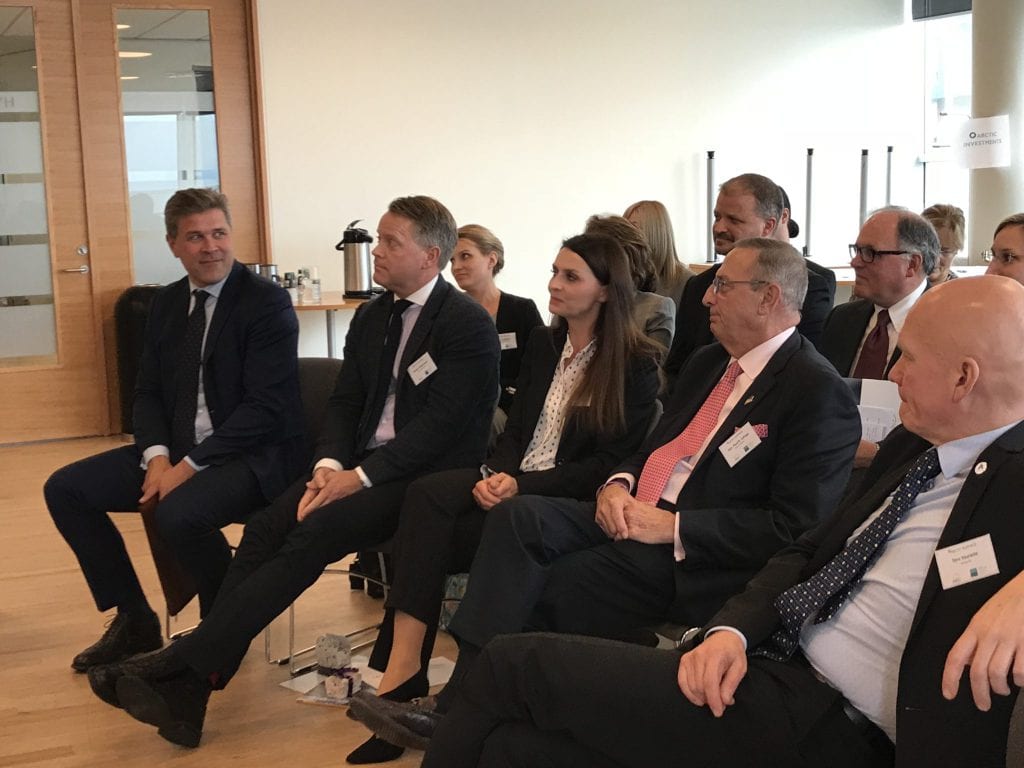
2018 Arctic Business Summit

2018 Arctic Business Summit was held in Reykjavik, Iceland on October 18 back-to-back with Arctic Circle Assembly.
After the three previous Arctic Business Summits in 2014, 2015 and 2017, the Arctic Economic Council (AEC) and the Norwegian Shipowners’ Association joined forces to organize the 4th Arctic Business Summit. The Summit was held in Reykjavik on October 18, 2018. Later the same week, Reykjavik hosted a significant number of Arctic stakeholders as the Arctic Circle assembly kicked off.

This year, Mr. Arne O. Holm, Editor-in-Chief of High North News, led the Summit as a moderator.
The Summit was opened by Ms. Ásdís Kristjánsdóttir, Director of Economic Division, Confederation of Icelandic Enterprise. She provided a global economy outlook in the light of rising uncertainties including trade wars. According to Ms. Kristjánsson, while global growth is expected to remain robust in the coming years, downside risks have risen. Trade tension and policy uncertainty affect negatively on investments and trade. While consumers and businesses are still positive, confidence is declining.
Ms. Kristjánsdottir highlighted the importance of trade to all economies no matter their size. This is especially true in the Arctic, where many nations are small raw material exporters who rely heavily on trade. In addition, the Arctic countries’ export is not diversified. Potentially higher import prices, restricted access to foreign markets and decreased foreign demand could negatively affect future growth as the Arctic’s economic prosperity is heavily dependent on export.
Protectionism has increased since the financial crisis. A full-blown trade war poses a further threat to global trade and growth. Escalating trade disputes can supress growth through uncertainty. This has a negative effect on investments and economic growth as well as in long term productivity growth.
AEC’s Chair Mr. Tero Vauraste addressed the new developments in climate, business and in politics. All these areas are significant for the development in the Arctic. Effects of trade barriers are 2-3 times higher in the Arctic than elsewhere because of weak value chains. In addition, he underlined that the Arctic regions have often a lot more in common than their capitals. Therefore, we should work more closely together as unified Arctic because of what connects us, Mr. Vauraste said.
During the Summit, the participants coming from 7 different countries also attended workshops. They discussed themes related to protectionism, investments and access to international value chains. Each group provided 3 recommendations related to their topic.
Following the workshop, Iceland’s Minister of Finance and Economic Affairs, Mr. Bjarni Benediktsson, joined the group. In his address, Mr. Benediktsson underlined that Iceland is keen to increase the collaboration between Arctic Council and Arctic Economic Council to promote sustainable development in the Arctic.

Hon. Paul LePage, Governor of the State of Maine from the United States elaborated on Maine’s view on the Arctic. As a non-Arctic state, Maine sees its location as a strength: if one changes perspective to the north, Maine has a strategic location at the beginning of this new horizon. For Maine, partnership with Arctic region generates good business and creates new jobs, Governor LePage concluded.
Before closing the Summit, the business representatives had an opportunity to engage in dialogue with Minister Benediktsson and Governor LePage and present their chosen priorities from the workshops.
After the Summit, AEC’s Vice Chair Mr. Heidar Gudjonsson presented a report from the discussions at the Arctic Circle assembly.
In his presentation, he addressed that the Arctic connects 90% of world economy and the challenge ahead is building infrastructure. Here, Asian stakeholders could be relevant partners. He also highlighted that just like climate change, also the effects of trade war will be felt more severely in the Arctic than elsewhere. Freedom of trade is essential for the sustainable development of the Arctic. Impacts of protective measures would hit undiversified economies hard, Mr. Gudjonsson said in his speech.
For the program of 2018 Arctic Business Summit, see here